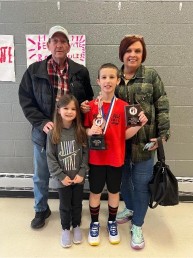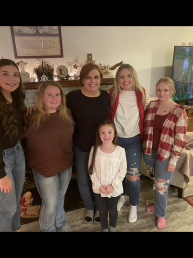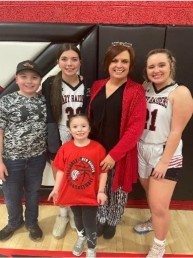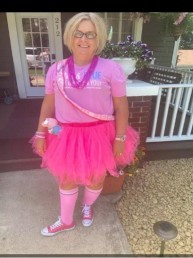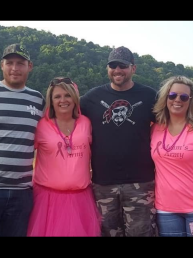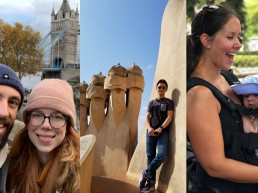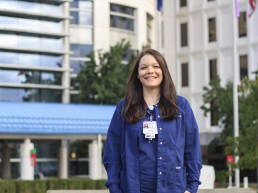By Sandy Miller, Senior Manager Performance Improvement, UPMC Health Plan
My name is Sandy Miller, and I am a wife, a mother, a grandmother, a daughter, a sister, an aunt, a friend, a nurse, a caregiver to two rescue dogs and two rescue cats, and a UPMC employee. My hobbies are endless—eight grandchildren keep me busy and take me all over the East Coast with them as they play sports, dance, race go-karts, and barrel-race horses. I also love the outdoors and spend my summer weekends kayaking on the Potomac River in West Virginia.
A few years ago, I was living a normal, but quite busy life. Keeping up with those grandkids is a lot! I had no idea that my life was about to change forever and that I’d be using a new phrase to describe myself: cancer patient. While taking a shower, I found an egg-sized lump in my left breast. In exactly one second, I knew my life was about to change.
Although I had extreme fatigue, I rationalized it was due to my very busy lifestyle. I had no idea a war was happening within my body, but I was about to find out. My diagnosis was Invasive Lobular Breast Cancer Stage 2. Invasive Lobular cancer represents about 15% of breast cancers.
"I wanted my journey to reflect my passion for helping others by sharing my story of how faith and positive thinking does make a difference when faced with learning to live with something we can’t control."
The weeks that followed were filled with every emotion I had ever felt—and some that were new. My life revolved around doctor appointments, testing (labs, scans, biopsies), prepping for the upcoming surgeries which would consist of a double mastectomy with reconstruction, and removal of my ovaries. After healing from my surgeries, it was time to start treatment.
During this time, I worked half days and had treatment in the afternoon; getting from the car to the recliner felt like I had walked miles. The surgeries and treatments spanned 18 months from the date of diagnosis. The quote “You never know how strong you are until being strong is the only choice” became my reality.
After the surgeries and treatments, I decided to make my journey a positive one, and I embraced the pink! My faith guides my life, and I decided to hand my burden over to the Lord because it was too much for me to carry. Around this time, I became a contact for those who are newly diagnosed with breast cancer and took on a role as a speaker to spread the word about the importance of mammograms and follow-up testing. I wanted my journey to reflect my passion for helping others by sharing my story of how faith and positive thinking does make a difference when faced with learning to live with something we can’t control.
In the months that followed my treatment, I lived a fairly normal life, which included quarterly checkups with my oncologist. Each day, I took an aromatase inhibitor (AI), which is designed to block the hormones that fed my cancer from binding to cancer cells. One of the side effects of this drug is joint pain, and there were days I had to slide out of bed onto my knees and then stand up.
Unfortunately, after the initial treatment ends, you do not receive any scans unless you have pain, and most oncologists do not draw blood for tumor markers (these markers rise if the cancer returns) because tumor markers are not always accurate. Fortunately, my oncologist did draw labs for tumor markers. 4 years and 11 months after my initial diagnosis, my tumor markers significantly rose from the normal range. My cancer was back.
It was a bit surreal; the only indication that my cancer was back was the increased tumor markers. Immediately my oncologist scheduled me for a full body scan, CAT scan, and blood work. The diagnosis was Stage IV metastatic breast cancer to the bones. This was a tough one, and it took me several weeks to pull myself together and get back into fight mode.
I thank God for the options available to treat this incurable disease and for the amazing cancer centers available to us at UPMC. I can’t say enough about the Hillman Cancer Center at UPMC Shadyside and my oncologist, Dr. Monica Malhotra. My lifelong treatment now consists of chemotherapy, monthly hormone-blocking injections, a bone-strengthening injection, lab work, and quarterly bone and CT scans.
"When you come out of the storm, you won’t be the same person who walked in. That’s what storms are all about."
I am very happy to tell you that my cancer is what they call “stable,” meaning it has not grown (which is the goal, but cancer is still there and always will be). I do have fatigue and pain at times, both are semi-controlled by medication at this point. I have brain fog which is known in the medical world as ‘chemo brain’—this is the hardest side effect for me to accept and challenges my everyday life.
A big part of my life now is being a speaker at events where I am asked to share my story. At every event, I remind everyone of the importance of taking time to stop and find something special in each day; even on the hardest of days, there is ALWAYS something to be thankful for.
Being diagnosed with terminal cancer did not stop my life. Instead, it enhanced how I see things, it gave me a chance to make time to do the things I always thought I was too busy for, and it reminded me that patience is a virtue (I needed this one). I have met some pretty amazing people along the way. I am busier than ever, and I embrace that; I never want to miss the important things or memories being made. Not every day is roses and rainbows, and believe me—there are dark days. But my mindset and determination have never let me down. I could spend all day telling you what and who I am thankful for: it takes a village of family and friends to keep me going.
I have to stop and recognize my gratitude for UPMC. Even though I am no longer on the front lines of nursing, I remain steadfast in our members’ corner, upholding UPMC Health Plan’s mission of providing quality care. With 15 years of experience in the health plan industry, I was keenly aware of the forward-thinking approach that UPMC Health Plan promotes. Additionally, the prospect of having top-rated physicians and specialists as part of my health team motivated me to become a part of that professional world.
I am thankful to not only receive treatment at the Hillman Cancer Center, but I am also thankful for my work network. The group I work alongside at UPMC Health Plan is an inspiration. The health plan as a whole promotes kindness in its culture, I witness it every day. Personally, I am the recipient of emails, texts, and messages just to ask how I am doing, they always seem to come at the right time. The act of kindness no matter the size goes a very long way.
I am so thankful for my health care benefits, because, as you can imagine, the cost of cancer is not cheap. My immediate work family in UPMC Health Plan’s quality department is second to none, and my leaders have given me a lot of grace and understanding along the way.
When you come out of the storm, you won’t be the same person who walked in. That’s what storms are all about. I know my life will never be “normal”, but I am rocking the “abnormal” side of life and hopefully, with God’s grace, will continue to do so for a long while. I will end with a quote by Ann Davis that hangs in my office: “Today is not a duty; it’s an honor. Today is not a challenge; it’s a chance. Today is not a race; it’s a gift.”

